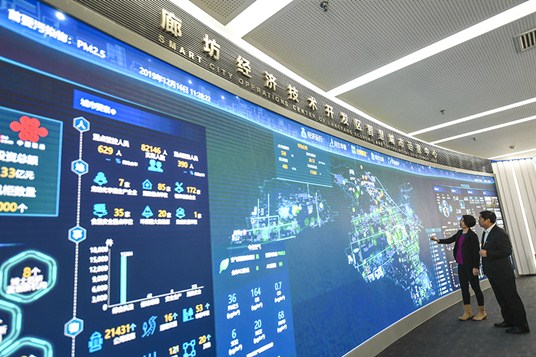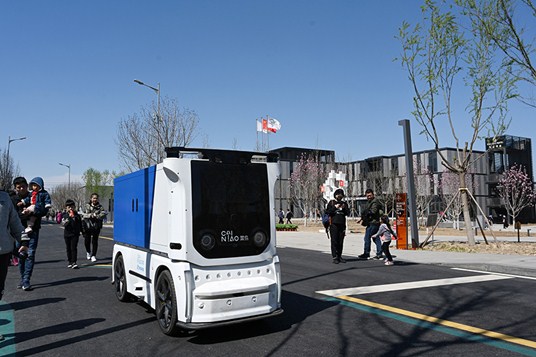Smart cities for an intelligent nation

Two technicians analyze data at the smart city operational center in Langfang city, Hebei province. [Photo/Xinhua]
Next-generation technologies like 5G, IoT, AI, big data and cloud computing spawn big biz and transform urban areas
Imagine ... no this isn't a mushy lyric ... Imagine a world of cities where multistory buildings, cars, traffic lights, people and a zillion other things all communicate with each other. Such "smart cities" will acquire dimensions of reality in China sooner than you would imagine, field experts said.
Powered by the next-generation information technologies such as 5G, mobile internet, internet of things, artificial intelligence and cloud computing, China is gearing up to develop smart cities nationwide.
In China, improving cities, especially metropolises, is an urgent and pressing demand as the urban population is growing amid rapidly increasing urbanization, experts said.
In 1949, just 10.6 percent of people, or 57 million residents, lived in 132 cities in China. But, by the end of 2018, nearly 60 percent of the country's population, or 830 million residents, lived in 672 cities. The figures continue to grow.
"As the population grows and we become more urbanized rapidly, the carrying capacity of the cities cannot sustain the pressure of population explosion. Diseases could emerge as new problems in cities due to resource shortages, traffic congestion and pollution, raising new concerns for the government's public management capabilities," said Shan Feng, deputy head of the Digital City Engineering Research Center, which is part of the Chinese Society for Urban Studies, at a meeting on smart cities in November in Beijing.
By the end of 2018, more than 500 Chinese cities proposed to build smart cities in their respective local government work plan, according to Shan.
Today, China has also become a key force in the development of smart city technologies and the industrial innovation globally.
A new report from market research firm MarketsandMarkets estimated the smart cities market in China is projected to reach $59.9 billion by 2023 from $30.4 billion in 2018 with a compound annual growth rate of 14.5 percent.
According to the report, the growth is mainly driven by the increase in population, the need for rapid urbanization and the government's investment and policies to speed up the implementation and development of smart city projects.
MarketsandMarkets noted China is the biggest marketplace in the Asia-Pacific region in terms of development of smart cities, and the APAC region is set to emerge as the main revenue contributor to the smart cities market globally.

Citizens shop for vegetables in a smart farm market in Changsha city, Hunan province. [Photo/Xinhua]
By 2023, the global market for smart cities is estimated to grow to $717.2 billion from $308 billion in 2018, at a compound annual growth rate of 18.4 percent, the company said.
In fact, the adoption rate of smart cities solutions is growing rapidly in China. Not only some big cities but small and mediumsized cities are actively embracing the digital solutions.
For instance, Yingtan, a city in Central China's Jiangxi province, is accelerating the push for building an internet of things-enabled digital economy.
By 2018, Yingtan's 1.1 million people had connected to the internet of things. And more than 200 internet of things companies have been set up in the city, helping Yingtan to better embrace the digital transformation.
So far, the city has officially provided more than 40 kinds of internet of things services, including 5G services, smart transportation, smart water utilities, smart streetlights and smart parking.
For instance, 95 percent of the local families have installed smart water meters, which help save 2.4 million metric tons of water a year.
Yao Yao, head of property investment and management consultancy JLL's research in China, said smart cities' construction plays a more important role in China when compared to other markets.
"On the one hand, the practice of smart cities will help alleviate the increasing burden on traditional infrastructure systems caused by the rapid increase in urban population. On the other hand, intelligent application in fields including travel, safety, health and energy will improve the quality of all aspects of the residents' life. And the key issue is how to meet people's growing need for a better life," Yao noted.
Seeing the growing potential in smart cities development, an increasing number of tech companies are ramping up the efforts to carve out a stake in the rapidly expanding sector.
Beijing Percent Information Technology Co Ltd has seen huge potential in the market. So far, it has served more than 10,000 clients both at home and abroad, including a number of government customers.

A Cainiao Network's self-driving electric express car runs in Xiongan New Area in Baoding city, Hebei province. [Photo/Xinhua]
"In the era of data intelligence, data has become a new and most important means of production, while data intelligence has become a key infrastructure in the cities," said Su Meng, chairman and CEO of Beijing Percent Information Technology.
According to Su, China has seen a growing number of digital cities and e-government projects on the ground.
"The digital cities market is really huge," Su noted. "The government is aware of the importance of data assets and the social benefits brought by the data sharing and exchanges. And now, we are at a very early development stage."
The company mainly provides e-government, digital cities and safety services for governments.
Powered by Percent's AI and big data technologies, governments will be able to access more data related to citizens, cars and other details in the cities. With a comprehensive big data governance and sharing platform, the government will be able to better operate in areas like market supervision, social governance and offering public services.
In fact, Percent has expanded its services globally. The company has built a visual national center data analysis and decision-making system for the Angolan government.
Previously, most of Angola's population information was recorded on paper, which was difficult to access and manage. With the new platform, the Angolan government can accurately and dynamically record entire data of local population in terms of birth, education, marriage, social security, fingerprint, faces and more.
A firm called G7 (not to be confused with G-7, or the Group of Seven, the leading industrial nations) is another example of Chinese companies actively engaging in the construction of smart cities. Unlike most tech firms eyeing the digital government solutions, G7 aims to empower traditional industries to embrace the digital transformation, which will not only help boost the productivity of the companies, but help create a better life for local citizens.
"Technology is having a profound impact on various industries," said Zhai Xuehun, founder and chief executive officer of Beijing-based internet of things company G7. "Based on the IoT, big data and artificial intelligence, G7 has already helped connect 98 percent of logistics factors to the internet in China. It is just a small step. We are also using the internet of things to inter-connect traditional industries, injecting new impetus into those industries."
Powered by its own internet of things technologies and algorithms, G7 is able to access the truck driver's real-time conditions. With AI and artificial means, G7 helps reduce the number of driver deaths to one-sixth of the previously reported number.
The company also offers a whole batch of services to drivers. With the support of the internet of things, drivers can make oil and gas payments online.
Shan Feng from the Chinese Society for Urban Studies said next-generation technologies such as the ultrafast 5G and smart cities will see rapid development, and new applications will pop up gradually.
"However, we are still facing some challenges in the development of smart cities," Shan said. "Some cities only focus on software and hardware investment, while local people seldom engage in the process and lack the sense of gain. More efforts are needed to shift the focus to residents, innovation, integration of different sectors and refined management."

